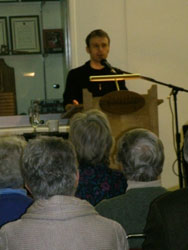Paddling Through Beautiful Landscapes Requires a Beautiful Canoe
Award-Winning Canadian author Nicolas Dickner delivers 2011 Jack Matthews Lecture
 Asked to speak on legendary canoeist Bill Mason, Quebecois writer Nicolas Dickner admitted to feeling like somewhat of an imposter. Citing Bill Mason as one of his personal heroes, Mr. Dickner nonetheless confessed to doing very little actual canoeing himself. “I spend much more time reading about canoes and thinking and dreaming about canoes than actually canoeing,” he told the audience of more than one hundred, gathered on Wednesday, January 27, 2011 at the Canadian Canoe museum for the third annual Jack Matthews Fellowship Lecture.
Asked to speak on legendary canoeist Bill Mason, Quebecois writer Nicolas Dickner admitted to feeling like somewhat of an imposter. Citing Bill Mason as one of his personal heroes, Mr. Dickner nonetheless confessed to doing very little actual canoeing himself. “I spend much more time reading about canoes and thinking and dreaming about canoes than actually canoeing,” he told the audience of more than one hundred, gathered on Wednesday, January 27, 2011 at the Canadian Canoe museum for the third annual Jack Matthews Fellowship Lecture. For Mr. Dickner, however, the idea of the canoe, and of canoeing, is as much a part of Canadian identity as the actual craft, which he described as appropriate for a country that in large part exists as nothing more than imagined space on a map. “Most of the country, for most of its inhabitants, is a map country,” says Mr. Dickner, referring to Canada’s unique geographic situation where he says that 75% of the territory is just impossible to visit. For Mr. Dickner, it is the symbolic aspects of the canoe as exemplified through Bill Mason’s life and works that resonate in the Canadian identity.
Mr. Dickner first read a French translation of Bill Mason’s Path of the Paddle as a teen, and was in awe of Bill Mason’s technical knowledge. According to Mr. Dickner, however, it wasn’t until much later that he saw the title of the book in English and suddenly realized that Bill Mason was much more than a technician, and that the Path of the Paddle was something more than just the way the paddle moved through the water.
For Mr. Dickner, Bill Mason’s focus in his later work on solo canoeing was a metaphor for the larger journey of life, and provides parallels to the writer’s life specifically. According to Mr. Dickner, Bill Mason enjoyed canoeing with friends, but found that paddling solo made the canoeist more observant.
Commenting on how connected and social a world we now live in, Mr. Dickner remarked that the writer must also shut himself off from the outside world to observe. Furthermore, Mr. Dickner drew inspiration from the physical challenges of the solo canoe trip, saying, “Deciding to write a novel really is like Bill Mason paddling against the stream and paddling up one of those little rivers on Lake Superior’s shore, and trying to do that absurd thing – to lift, all by yourself, a 75-pound canoe and portage it upstream, up waterfalls.”
Bill Mason’s life and work, however, serves as inspiration to all Canadians. “In the end,” mused Mr. Dickner, “Bill Mason’s biography, his life – should be read like a novel. It’s full of short-cuts and symbols and beautiful lies. And one of the biggest, most beautiful lies about Bill Mason is the “Prospector” itself,” said Mr. Dickner, referring to Bill Mason’s iconic chestnut Prospector canoe, currently on display at the Canoe Museum. According to Mr. Dickner, the canoe is actually one of several prospector canoes owned and paddled by Bill Mason, but that over time, the legend had eclipsed the reality. Mr. Dickner finds this merging of fact and fiction a fitting tribute for a man who was as concerned with the aesthetics of canoeing as he was with the technical aspects of the craft. “Bill Mason thought that paddling through beautiful landscapes required a beautiful canoe,” observed Mr. Dickner, “and I think this idea of balancing aesthetic appeal and technical efficiency really sums up what elegance is about.”
The occasion also served to mark the opening of the McLean Matthews Gallery in the former lobby, named after long-time museum supporters William McLean and Jack Matthews. Executive director James Raffan welcomed guests from Lakefield College School, Trent University and the wider community to the new space amidst the museum’s first exhibit of international canoes. According to General Manager John Summers, the McLean Matthews Gallery will feature a new show every year, with exhibits being opened each April at the Canoe Museum’s annual general meeting.
Nicolas Dickner was born in Rivière-du-Loup, Québec, in 1972 and travelled extensively in Europe and Latin America before settling in Montréal. His first novel, Nikolski, won five awards in Québec and France, and was the winner of Canada Reads 2010. He is currently a literary columnist for the weekly magazine Voir and is working on his third novel.
Trent University’s Jack Matthews Fellowship was created to honour Jack Matthew’s founding contributions to the Trent International Program, Lakefield College School and the Canadian Canoe Museum.
